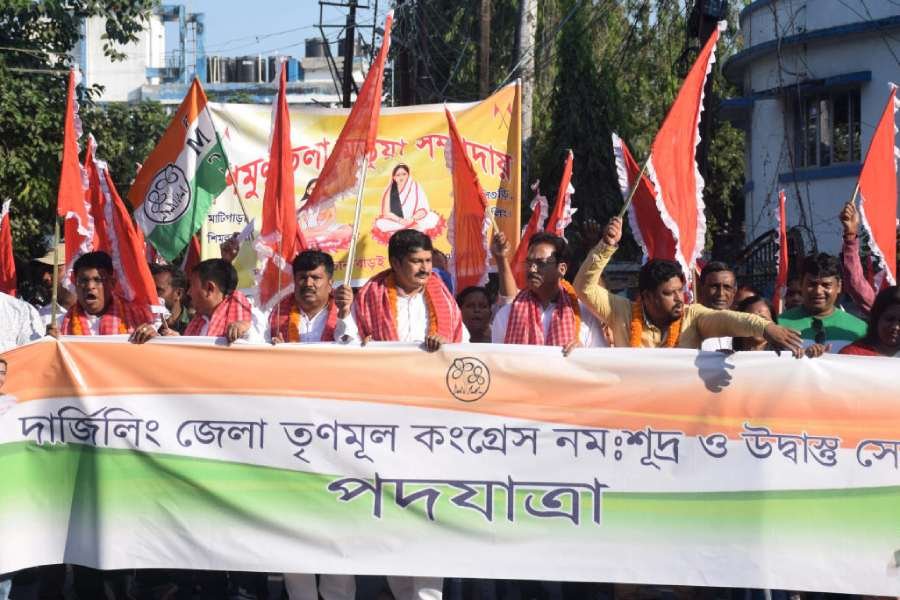Some members of the Matua community in north Bengal, affiliated to Trinamul, held a protest rally in Siliguri on Thursday, decrying the BJP’s alleged apathy towards them
Subhashis Chaudhuri, Calcutta: Union home minister Amit Shah’s big-bang promise to implement the Citizenship (Amendment) Act, 2019, made during his Esplanade rally on Wednesday has triggered doubts and debates among the Matua community.
Several Matua leaders in south Bengal expressed scepticism over Shah’s pledge. Some members of the Matua community in north Bengal, affiliated to Trinamul, held a protest rally in Siliguri on Thursday, decrying the BJP’s alleged apathy towards them.
The Matuas, who are Scheduled Caste immigrants from Bangladesh, remain divided along political lines. While a significant number owe allegiance to the saffron camp, the doubt over Shah’s promise of implementing the CAA 2019 was all-pervasive.
“Unless the CAA rules are framed and its implementation is fast-tracked, it will be difficult for us to seek votes from the community… I shall withdraw myself from campaigning as there is a possibility of a backlash from the community due to the delay in delivering on the promise,” said BJP MLA of North 24-Parganas’ Haringhata and a prominent Matua face, Asim Sarkar.
On Wednesday, Shah said: “The CAA is an Act in our country and no one can stop its implementation. I will ensure this.”
As his statement came against the backdrop of a wait of four years — the CAA was passed in the Parliament in December 2019 — the last 24 hours witnessed a heated debate and some political realignments among the Matuas.
The Trinamul faction of the Matuas used the growing discontent over the delay in the CAA’s implementation to sow seeds of suspicion among the community by referring to the divergence between the comments made by Shah on Wednesday and junior home minister Ajay Kumar Mishra earlier this week.
“The junior home minister advocated the use of community identity cards issued by All India Matua Mahasangha earlier this week…. Then Amit Shah-ji spoke about CAA implementation. There is a concerted attempt to mislead the community members before the Lok Sabha polls,” said Prasenjit Biswas, a lawyer and general secretary of the pro-Trinamul faction of the Matuas.
The Trinamul faction has also called a mega rally in Calcutta on December 28 demanding unconditional citizenship.
Economist and activist Prasenjit Bose said that the BJP was trapped in its own web.
“They have now understood that Rules under CAA 2019 cannot be framed to ensure unconditional citizenship to the Bengali refugees because the law prescribes an application process subject to the fulfilment of several conditions and restrictions. That’s the reason why the Centre couldn’t frame the rules even in four years”, Bose told The Telegraph.
In the early 1990s, the BJP first raised the issue of infiltration from Bangladesh and launched a movement demanding pushback of the illegal migrants.
“The Citizenship Act, 2003, passed under the Vajpayee government rendered all refugees from Bangladesh as ‘illegal migrants’ and set the stage to prepare the National Register of Citizens (NRC). The recent NRC exercise in Assam proved how such a hunt for ‘illegal migrants’ can create a citizenship crisis for a very large number of people,” said Bose.
According to the economist, the 2003 Act is at the root of the problems in the saffron narrative.
“The NDA government put a bar on Indian citizenship by birth if either of the parents is an ‘illegal immigrant’. The Matuas also raised their voice against this clause…. The BJP has tried to resolve it through CAA 2019 by clubbing the refugees from Bangladesh with those from Pakistan and Afghanistan, who were already staying in India under long-term visas. But their total numbers, the context for migration and current situation are very different. That’s why they can’t frame the rules,” Bose added, maintaining that unconditional citizenship cannot be guaranteed to Bengali refugees through the CAA 2019 route.

